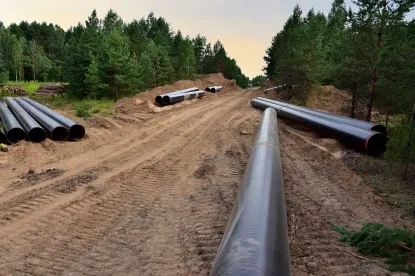Five days after upholding a water quality certification issued by the state of Virginia for the Mountain Valley Pipeline (MVP), the same three-judge panel of the federal Fourth Circuit Court of Appeals vacated a similar certification issued by the state of West Virginia. Sierra Club, et al. v. West Virginia Department of Environmental Protection and MVP, Appeal No. 22-1008 (April 3, 2023). Under § 404 of the federal Clean Water Act (CWA), construction activities directly impacting “jurisdictional waters,” such as placing a pipeline through or under a stream, require a “dredge and fill” permit issued by the Corps of Engineers. Before a § 404 permit may take effect, states in which such activities take place must issue a certification under § 401 of the CWA stating that the proposed activities will not violate state water quality standards (assuming compliance with specified conditions). The 34-page opinion identifies four reasons why the panel believes the § 401 certification issued by the West Virginia Department of Environmental Protection (Department) for MVP was “arbitrary and capricious.”
First, the Court concluded that the Department failed to adequately explain why the agency believed MVP’s past permit violations will not continue to occur. According to the Court, the Department was required to impose conditions intended to reasonably assure that “no violations of any applicable water standards would occur” (emphasis in original) and the agency failed to explain how the conditions of the certification would do so. In particular, the Court stressed that even a finding that the MVP project will present “no significant adverse aquatic impacts” does not necessarily show that narrative water quality standards will not be violated (e.g., the prohibition against discharges that cause or contribute to “suspended solids”). Further, despite the Department’s previous assessment of over $569,000 in penalties against MVP for violating permit requirements and water quality standards, the Court rejected arguments that enforcement of existing standards would be sufficient. In light of the “highly deferential” standard applied when evaluating § 401 determinations, delving into the details of the Department’s interpretation and application of its state-specific narrative standards is remarkable to say the least.
Second, the Department did not include a specific condition in the § 401 certification requiring MVP to comply with the terms and conditions of two documents: (1) a general stormwater management permit applicable to certain construction activities associated with oil and gas development (Stormwater Permit); and (2) a “stormwater pollution prevention plan” reflecting specific practices to manage stormwater discharges from areas disturbed by pipeline construction (SWPPP). The Court rejected the Department’s position that the agency has inherent authority to enforce the Stormwater Permit and SWPPP against MVP, and thus including a provision in the § 401 certification requiring compliance with those documents would be redundant. In doing so, the Court seemed to suggest that any state environmental requirement that is not explicitly identified in a § 401 certification may be “preempted” by federal law that governs the authorization of natural gas pipelines.
Third, the Court faulted the Department for citing stormwater management standards published by the federal Environmental Protection Agency (EPA) applicable to activities in upland areas as support for the requirements that were imposed on MVP’s in-stream construction activities. The Department observed that EPA’s standards were “nearly identical” to the standards set forth in the Stormwater Permit, and that it viewed the EPA standards as applicable to both upland and in-stream activities. Nevertheless, the Court held that the Department’s § 401 certification must be struck down due to the absence of “a more thoroughly reasoned analysis to place beyond doubt that it had made a rational connection between EPA’s [stormwater standards] for upland construction and the certification of MVP’s in-stream construction.”
Lastly, the Department did not conduct location-specific reviews to determine whether MVP’s stream crossing construction activities would degrade water quality. Also known as “anti-degradation review,” the CWA generally requires a determination that construction activities in or near streams will not degrade water quality. The Department reasoned that location-specific evaluations were not required because compliance with the Stormwater Permit and SWPPP would prevent water quality degradation, or at least limit any degradation to temporary conditions. The Court observed that such a conclusion would be reasonable if the Department had required compliance with the Stormwater Permit and SWPPP as conditions of the certification. Nonetheless, because the Department failed to include such conditions in the § 401 certification, its reliance on the SWPPP and the Stormwater Permit was deemed to be arbitrary and capricious.
The April 3, 2023 ruling constitutes the third opinion issued by the Fourth Circuit in the past five years concerning CWA § 401 certification actions by the Department. In 2018, the Court ruled that the Department did not follow the proper procedures to waive its authority to issue an individual CWA § 401 certification for MVP. In 2020, the Court precluded the Corps of Engineers from certifying MVP’s eligibility for a “nationwide” CWA § 404 dredge and fill permit because the Department, according to the Court, lacked the authority to modify a previously issued general § 401 certification for the “nationwide” § 404 permits to incorporate provisions addressing pipelines like MVP.
While the Court’s decision will likely cause further delay in completing MVP, the identified deficiencies do not appear insurmountable. Bolstering compliance requirements and enforcement incentives should be sufficient to address MVP’s violation history. Simply including a condition in a new § 401 certification requiring compliance with the Stormwater Permit and SWPPP should address two of the four deficiencies. Lastly, “a more thoroughly reasoned analysis” explaining the connection between EPA’s stormwater standards for construction in upland areas and MVP’s in-stream construction should address the last deficiency.
Five days earlier, the same three judge panel issued an opinion upholding such a certification for MVP issued by the Virginia State Water Control Board, at the recommendation of the Virginia Department of Environmental Quality (VADEQ). Sierra Club, et al. v. State Water Control Board, et al. and MVP, Appeal No. 21-2425 (March 29, 2023). In that decision, the Court determined that the Water Control Board’s decision to certify a Corps’ authorization under CWA § 404 for the pipeline’s 236 surface water crossings in Virginia was neither arbitrary nor capricious. Among other reasons, the Court noted that the VADEQ had conducted a thorough public comment process and prepared a detailed “Final Fact Sheet,” addressing all major issues raised by commenters. VADEQ had explained its individual consideration of each crossing (something not required by state law) and its determination that the location of the pipeline represented the “least environmentally damaging practicable alternative.” As the Court explained, the Board and VADEQ were simply required to show that they had “considered the relevant data and provided a satisfactory explanation for their conclusion.” The record demonstrated that it had done so, and none of the Petitioners’ arguments was sufficient to support a contrary determination under the deferential standard of review that applies.





 />i
/>i

